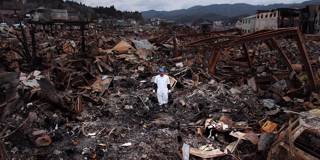After the 2011 East Japan Great Earthquake and tsunami devastated much of Japan, some economists proposed that the government should finance the recovery by raising taxes, rather than issuing debt. This approach is the equivalent of imposing fiscal austerity during a recession.
TOKYO – In mid-October, as Japan was being battered by Typhoon Hagibis – the most powerful typhoon to hit the country in over six decades – it was also shaken by a magnitude 5.7 earthquake. As climate change progresses, Japan, like the rest of the world, will face increasingly frequent and severe natural disasters, necessitating costly recovery efforts. Tax hikes are not the way to pay for them.
Soon after the 2011 East Japan Great Earthquake and tsunami devastated much of Japan, two influential economists, Motoshige Ito and Takatoshi Ito, whom I highly respect otherwise, proposed in the Nikkei that, to avoid burdening future generations, the government should finance the recovery by raising taxes, rather than issuing debt. Hundreds of economists endorsed the proposal.
But the approach could not be more wrong. Indeed, it contradicts the theory of public finance, which states that the response to temporary shocks, such as natural disasters or wars, should be financed by temporary increases in the deficit.

TOKYO – In mid-October, as Japan was being battered by Typhoon Hagibis – the most powerful typhoon to hit the country in over six decades – it was also shaken by a magnitude 5.7 earthquake. As climate change progresses, Japan, like the rest of the world, will face increasingly frequent and severe natural disasters, necessitating costly recovery efforts. Tax hikes are not the way to pay for them.
Soon after the 2011 East Japan Great Earthquake and tsunami devastated much of Japan, two influential economists, Motoshige Ito and Takatoshi Ito, whom I highly respect otherwise, proposed in the Nikkei that, to avoid burdening future generations, the government should finance the recovery by raising taxes, rather than issuing debt. Hundreds of economists endorsed the proposal.
But the approach could not be more wrong. Indeed, it contradicts the theory of public finance, which states that the response to temporary shocks, such as natural disasters or wars, should be financed by temporary increases in the deficit.